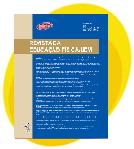Effects of karate-dô training in older adults cognition: randomized controlled trial
Resumo
The aim of this study was to verify the effectiveness of a Karate-Dō training, Wadō-ryū style, on cognition in healthy older adults. We conducted a single-blind randomized controlled trial with 33 older adults divided into Karate Group (KG) and Control Group (CG). In the pre and post-intervention, participants answered a sociodemographic questionnaire, a battery of neuropsychological tests, scales of subjective cognitive complaints, depressive and anxiety symptoms. The intervention was conducted twice per week for 12 weeks (lasting 60 minutes). The CG did not perform any physical activity or cognitive stimulation during the intervention period. Data analysis was performed using descriptive and inferences statistics. Performance comparisons in neuropsychological tests and scales of subjective cognitive complaints, within and between groups, pre and post-intervention, was performed by Mann-Whitney and Wilcoxon tests. KG shows better results than CG in visual memory tasks, executive functions and memory complaints in post-intervention analysis. The results suggest that 3 months of Karate-Dō practice is related to a significant improvement of the cognitive functions in healthy older adults.
Downloads
Metrics
•Os autores detém os direitos autorais, permitindo citações de seu conteúdo em outros veículos de informações científicas e técnicas.

Este obra está licenciado com uma Licença Creative Commons Atribuição 4.0 Internacional.













_1502.jpg)











